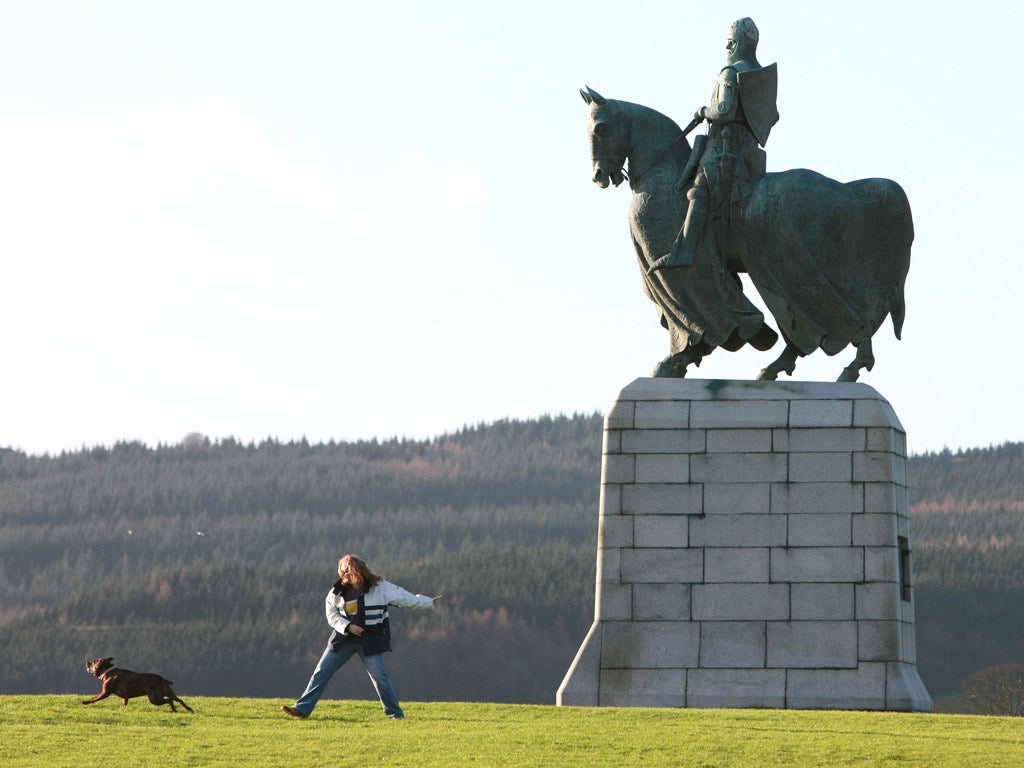Spirit of Bannockburn thrives north of the border
While symbols of nationalism proliferate at the site of the battle, not everyone's mind is made up, says Hamish Macdonell

Six hundred and ninety eight years ago at Bannockburn, nestling in the lee of the snow-capped Ochil Hills, Robert the Bruce masterminded the Scottish nation's most famous, against-the-odds victory, smashing the invading army of Edward II into the nearby burn.
If anywhere can claim to represent the beating heart of Scottish nationalism then it's this tiny village.
It has now emerged that the SNP wants to time its referendum on Scottish independence for 2014, to coincide with the 700th anniversary of that victory – something the British government is strongly opposed to.
It is easy to see, though, why Alex Salmond wants to capitalise on that Bannockburn spirit. That one famous victory has a huge hold on the Scottish psyche, even today – a statue of the Scottish king on his charger sits on the hillside above the village, towering over both the King Robert Hotel and the nearby 1314 Bannockburn Pub.
Saltires flap on flag posts in many of the front gardens but these are not heritage pieces to draw the tourists; they are symbols of the new, confident Scottish nationalism which carried Mr Salmond to his victory in the Scottish elections last May.
Alan McAllister, a retired merchant navy seaman, can stand under the Scottish national flag in his garden and see the statue of Robert the Bruce on the hillside beyond. He can then retire to his garden shed and sit under a map of Scotland, and dream realistically for the first time about an independent Scotland.
Mr McAllister was derisive about the Prime Minister's decision to call for the referendum to be held as soon as possible. "Scotland has the right to hold the referendum when it wants. We should have it in 2014, not when David Cameron wants it," he said.
"I think David Cameron is a liability. It should be the Scottish Parliament that decides when to hold the referendum. The more he intervenes, the more he will attract Scots to independence."
Mr McAllister is one of an increasing number of Scots who believe the country will vote to disband the Union. Another is Lynn McQue, a nurse from nearby St Ninians. She will also vote Yes in the referendum. "I don't like being ruled by the Queen and the Tories. They have no mandate in Scotland," she said.
However, Kirstie Inglis, a barmaid who walks her dog on the hillside above Bannockburn, is one of those who have yet to be convinced by the independence arguments. "I'm not sure the economics add up," she said. "Most of the overseas visitors who come here don't just come to see Loch Lomond and the Trossachs; they go to London first. We are part of the same country and we have a lot to lose."
Barry Fulton is another who is sceptical. He works at the Faslane naval base on the Clyde which services Britain's nuclear submarines – weapons the SNP has vowed to ban from Scottish waters under independence.
"I depend on Faslane for my livelihood," he said. "I know others are in favour of independence but I really have mixed views about it."
With some Scots vehemently in favour of independence and others reluctant to back Mr Salmond's dream, the result of the referendum will probably be decided by those like Danny Connell, who runs his own decorating business in Bannockburn.
Like many Celtic fans, Mr Connell has been angered by Mr Salmond's decision to crack down on sectarianism, a move which may well lead to the banning of many traditional Old Firm match-day songs. But, despite his fury over the SNP's moves on this issue, he hasn't made up his mind just yet.
"Scotland can go it alone; there is no doubt about it. I think Scotland will vote for it," he said.
Mr Connell does seem to represent a new trend in this long-running political argument. Previously, people like Mr Connell would probably not have even considered independence.
Now he not only knows the issue is on the table, but he is relaxed about it happening as well.
Mr Salmond believes that, if he gets another two and a half years to sell his message, he can persuade peole like Mr Connell to back his plan.
Subscribe to Independent Premium to bookmark this article
Want to bookmark your favourite articles and stories to read or reference later? Start your Independent Premium subscription today.

Join our commenting forum
Join thought-provoking conversations, follow other Independent readers and see their replies